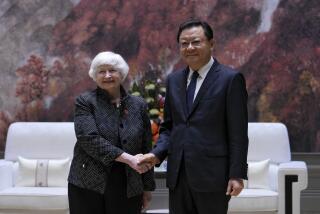China Can Float Its Currency, U.S. Official Says
- Share via
WASHINGTON — A top Treasury Department official said Thursday that China now had the ability to let its currency’s value be set on the open market, a step that would presumably force its value upward and moderate the U.S. trade deficit with the world’s most populous country.
John Taylor, undersecretary of the Treasury for international affairs, said China had adopted all the institutions it needed to let its currency float without sinking on world markets. He noted that Chinese officials had recently visited the Chicago Mercantile Exchange on the way to establishing a commodities market, one of the underpinnings of an economic system that can support a free-floating currency.
“They can begin to have a flexible exchange rate right now,” Taylor said.
China has pegged the value of its yuan to the dollar at a rate that the Bush administration and most U.S. exporters believe is artificially low, thus making Chinese products inexpensive in global competition with American goods. The U.S. trade deficit with China in February alone was $13.9 billion, or one-quarter of the entire U.S. trade gap.
President Bush on Thursday also urged China again to let the yuan float on currency markets. Answering questions after speaking to the American Society of Newspaper Editors, Bush said his administration was putting pressure on China in several areas, including human rights and terrorism.
“On trade, we’re pressing China, for example, for floating her currency, so we can have free and fair trade,” he said.
Bush and Taylor spoke in advance of today’s opening of meetings of the Group of 7 industrialized nations. The spring meetings of the International Monetary Fund and the World Bank also begin today in Washington.
Chinese officials participated in the two most recent meetings of the big-country finance ministers, but Taylor cautioned against interpreting China’s absence from this week’s meetings as a sign of disagreements over the value of the yuan.
The dialogue will continue, Taylor said. He said he hoped this weekend’s meetings of the IMF and the World Bank would continue progress toward debt relief for the poorest countries, mostly in Africa. But he said he did not expect agreement before the summit of the seven richest democracies plus Russia, scheduled for Scotland in July.
That is not soon enough for the groups that plan street protests during the weekend’s IMF and World Bank meetings.
Njoki Njoroge Njehu, of the 50 Years Is Enough Network, said at a news conference that more than 300 children die every day of diseases that could be prevented with the money that is instead going to debt service.
The industrial democracies canceled their loans to the debtor countries in 1999, but it would cost the World Bank about $21 billion and the IMF $7 billion to wipe the debts of the poorest countries off the books.
Progress has stalled, said Neil Watkins, national coordinator of Jubilee USA Network, not because of disagreement over principle but over the mechanics of debt relief.
The protesters say the IMF has enough gold to cover debt forgiveness for all the poorest countries, but the IMF says selling all that gold at once would disrupt world markets.
More to Read
Sign up for Essential California
The most important California stories and recommendations in your inbox every morning.
You may occasionally receive promotional content from the Los Angeles Times.










